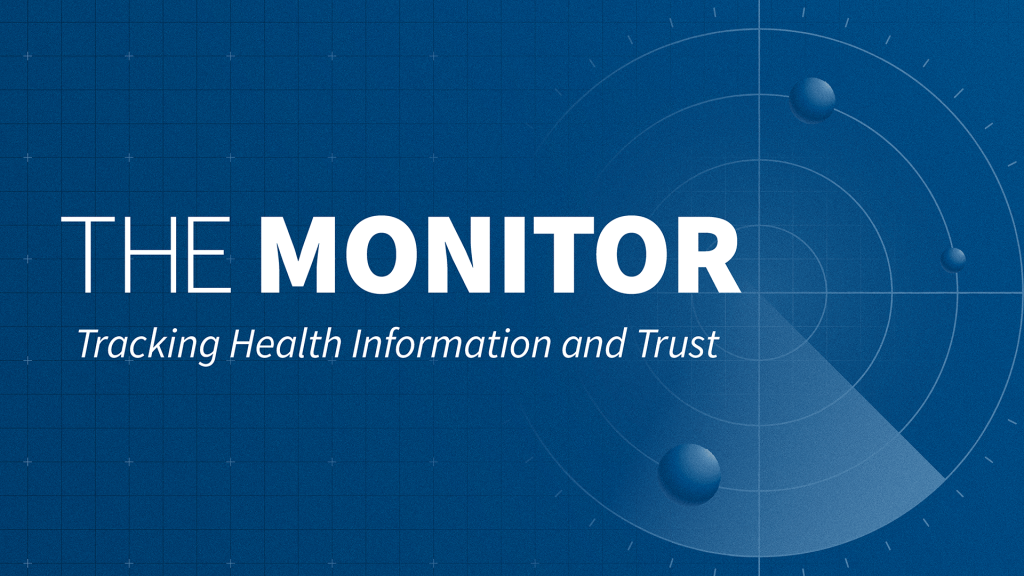VOLUME 35
Fake AI-Generated Videos Perpetuate Stereotypes About SNAP Recipients, And New KFF Poll Looks at Belief in the False Claim That Undocumented Immigrants Are Eligible for ACA Coverage
Summary
This volume examines how AI-generated videos contributed to false narratives about Supplemental Nutrition Assistance Program (SNAP) recipients during the government shutdown, lending alleged visual evidence to decades-old stereotypes about beneficiaries of government assistance. It also highlights findings from KFF’s latest Health Tracking Poll on beliefs about undocumented immigrants’ eligibility for health insurance through the Affordable Care Act (ACA). Lastly, it shares updates on a film amplifying false vaccine claims, Louisiana officials’ delayed response to a whooping cough outbreak, efforts in medical education to address shame in clinical settings, and a survey revealing distrust of news media among U.S. teens.
AI & Emerging Technology
AI-Generated Videos Spread False SNAP Narratives During Government Shutdown
What’s happening?
- Fake videos of public assistance beneficiaries created using artificial intelligence (AI) spread online during the government shutdown, receiving millions of views and potentially contributing to misconceptions about who uses SNAP and deepening longstanding harmful racial stereotypes. SNAP provides food assistance benefits to approximately 42 million Americans, according to data from the United States Department of Agriculture (USDA), with White people making up the largest share of beneficiaries, and many recipients either working or actively seeking employment. Eligibility for the program includes work requirements, and more than half of households with children that receive SNAP benefits also receive earned income. SNAP fraud is rare, and analysis has shown that more than 98% of those receiving benefits were eligible.
- Despite this reality, these AI-generated videos gave new reach to decades-old myths that people who receive benefits from SNAP and other government assistance are taking advantage of these programs and choosing not to work. The AI-generated videos predominantly depicted Black women arguing with retail employees about their benefits, stealing from grocery stores, or boasting about receiving public assistance while unemployed. KFF’s monitoring of social media identified several examples of these videos posted throughout the shutdown that accumulated millions of views within days. Many of the videos contained indicators that the content was AI-generated, such as mismatched audio-visual sync. Major news outlets, including Fox News, have faced criticism for sharing this AI-generated content as authentic reactions to the Trump administration’s decision to withhold SNAP payments during the government shutdown. Fox News later corrected its coverage after online commenters pointed out that the videos were AI-generated.
Why this matters
News reports covering these videos linked them to the “welfare queen” stereotype that emerged in the 1980s because they falsely depict benefit recipients, particularly Black women, as abusing government assistance and avoiding work. AI can be used to give these myths new visual “evidence,” as the technology makes it easier to create seemingly authentic testimonials that confirm existing biases. In addition to perpetuating harmful racial stereotypes, this false narrative has historically been used to justify cuts to government assistance programs and promote policies that further limit access to assistance and make it more difficult for people who qualify to access support. Similar narratives are likely to emerge again during future policy debates about benefit programs.
Recent Developments
KFF’s Latest Health Tracking Poll Finds That Half of the Public Correctly Say Undocumented Immigrants Are Not Eligible for ACA Coverage, But Many Are Uncertain
Amid debates over the recent government shutdown, some Republican lawmakers claimed that Democrats’ efforts to reverse some provisions of H.R.1, the “One Big Beautiful Bill Act,” would allow undocumented immigrants to receive federally subsidized health insurance. Undocumented immigrants are not eligible to purchase coverage through the ACA marketplaces, or enroll in federally funded coverage, including Medicaid, CHIP, or Medicare.
Fielded during the government shutdown, KFF’s latest Health Tracking Poll finds that about half (47%) of the public correctly say that undocumented immigrants are not eligible to buy health coverage on the ACA marketplaces, while 14% incorrectly say undocumented immigrants are eligible for this coverage. Notable shares, however, express confusion, with about four in ten (39%) adults saying they are “not sure.”
Notably, similar shares of Republicans (57%) and Democrats (52%) correctly say undocumented immigrants are not eligible for this coverage.
What We Are Watching
New Film Contributes to Misleading Vaccine Claims on Social Media
A film released in October by an advocacy group opposed to childhood vaccination that amplifies false claims about the safety of children’s vaccines was frequently cited in discussions about vaccine safety. KFF’s monitoring of social media found that the film’s title, “An Inconvenient Study,” was mentioned in over 60,000 posts, reposts, and comments across X, Reddit, and Bluesky, this year as of November 19. The film describes an unpublished study purporting to show higher rates of chronic illness among vaccinated children, suggesting that its findings were concealed from the public. Henry Ford Health System, where the study originated, has issued a cease-and-desist notice to the filmmakers, stating the research did not meet its scientific standards, and independent experts have identified methodological flaws with the study’s design. False claims about vaccine safety, like those shared in the film, may contribute to declining vaccination rates. The KFF/Washington Post Survey of Parents found that those who skipped or delayed vaccines for their children were more likely to believe vaccine myths.
Louisiana’s Delayed Response to Whooping Cough Outbreak
Louisiana is experiencing its worst outbreak of whooping cough in 35 years, with 387 cases reported as of September 20. The outbreak began in September 2024, but reporting from a partnership that includes KFF Health News and NPR showed that state health officials waited months to alert physicians or conduct public outreach. The decision to withhold outbreak information could exacerbate declining trust in state health officials. KFF polling finds that just under half of adults report having a great deal or a fair amount of trust in their state health officials to provide reliable information about vaccines.
New Efforts to Combat Shame in Healthcare Settings to Improve Trust
The provider-patient relationship can play a role in how people access and understand health information. Patients who feel shamed in clinical settings may avoid asking questions, which can limit their access to information and guidance. Recent KFF Health News reporting describes efforts in medical training to reduce the potential for patients to feel shamed. Addressing shame in clinical settings could help support people’s understanding of health information, as many people are uncertain about health information and are likely to trust their doctor. KFF’s recent Tracking Poll on Health Information and Trust shows that personal doctors continue to remain one of the most trusted sources of health guidance among the public, so how they communicate might influence whether patients feel safe discussing concerns and access accurate information.
Survey Finds Teens Hold Negative Views of News Media
A new report from the News Literacy Project found that 84% of teenagers in the U.S. expressed negative sentiment when asked to describe news media, with many believing journalists regularly engage in unethical behaviors. When asked what journalists do well, about one-third of teens offered negative feedback, saying journalists were skilled at things such as “lying and deceiving.” This widespread distrust of news media among teenagers could affect how they seek out and evaluate health information, a trend that health communicators may need to consider when developing outreach strategies.
Support for the Health Information and Trust initiative is provided by the Robert Wood Johnson Foundation (RWJF). The views expressed do not necessarily reflect the views of RWJF and KFF maintains full editorial control over all of its policy analysis, polling, and journalism activities. The data shared in the Monitor is sourced through media monitoring research conducted by KFF.




